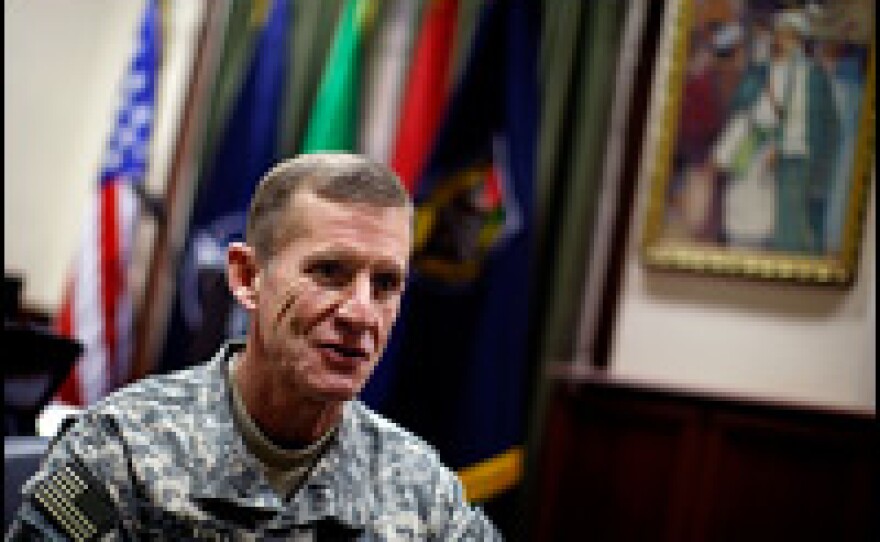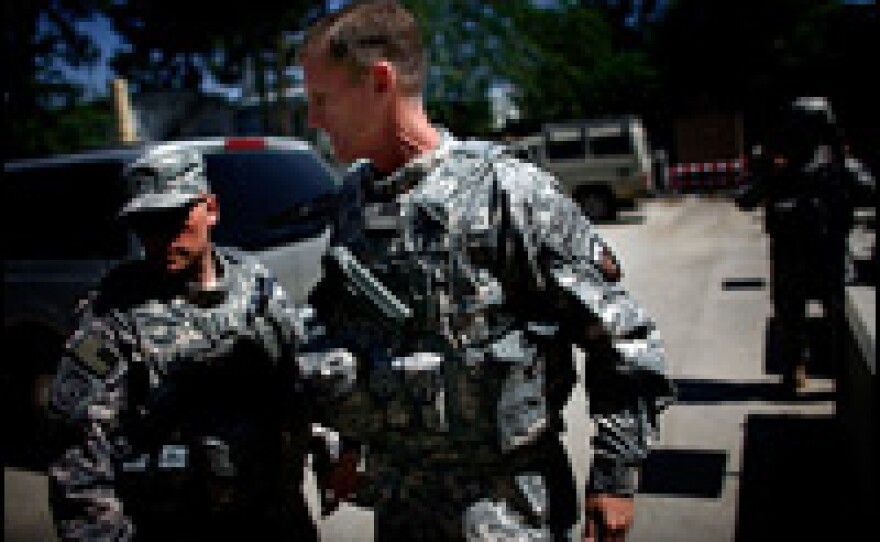

Army Gen. Stanley McChrystal, a former special operations commander, took charge of nearly 90,000 U.S. and NATO troops in Afghanistan this week to lead the Obama administration's new strategy against the Taliban insurgency. In his office at headquarters in Kabul, the Afghan capital, McChrystal spoke with NPR's Tom Bowman about his mission.
Is America winning in Afghanistan now?
I don't think the real question is whether America is winning. I think the question is whether the government of Afghanistan and the people of Afghanistan are winning, because ultimately, it's their victory that matters. I think that in terms of winning the security part of it, I would not say at this point that they are winning the war. I don't say they're losing.
If they're not winning, doesn't it mean they're losing?
That's an old axiom in counterinsurgency: If you're not winning, you're losing. And the danger there is that that is true. So, we see it as very, very important, probably over about the next 12 to 24 months, that we absolutely get a trend where we are clearly winning.
Your experience is in the area of special operations. You're basically a hunter-killer. You've hunted down bad guys like Saddam Hussein, but this is a very different fight; it's a counterinsurgency. How is it different from your previous job?
It's interesting. I did spend an awful lot of time as a counterterrorist, which was in the hunter-killer mode. But what I learned is that much of the terrorism we fought years ago was very small groups that were finite, they were fanatical, and they could be attacked that way.
Nowadays, we have to fight the cause of terrorism because terror is a tactic. You win by taking away from the enemy the one thing the insurgent absolutely has to have, and that's access to the population.
We spent some time with [Army] 3rd Special Forces Group in Shindand, and their approach to this seems to be very different from other Special Forces groups. They push rebuilding. Those who were coming in after them, 7th Group, were told they push the more aggressive part of this, actually going out and attacking the Taliban. How do you reconcile those two?
You have to do a little bit of both, but I very much lean toward the importance of the building side. If we can get into the population areas, and we can build security, build governance, build development alongside Afghan partners, then we give the population something that they want to protect. The insurgent, then, becomes a troublemaker.
The opposite could be perceived, even with good intentions. If we are just hunting Taliban, we can be perceived as coming into areas and being someone who upsets the neighborhood. But we do need to be able to keep a pressure on the enemy as we push them away. So there's always a balance.
Getting back to your previous job, you were in charge of the effort to get al-Qaida leader Osama bin Laden. How did the military, how did you let bin Laden slip through your fingers?
Wish we could have gotten him. He, I believe, has gone into difficult terrain and has stayed fairly carefully hidden, and it would have been very, very difficult to go root him out there.
When you say "difficult terrain," do you mean politically difficult or physical terrain?
It was difficult politically, it was difficult physically, and it was difficult culturally, because of the population areas where we believe that he was.
Meaning going into Pakistan — it would have been difficult to go in and get him?
Sovereign country.
You've lived your professional life in the shadows. Now your job is head of NATO forces as well, besides American forces. It almost calls on you to be an ambassador. How do you make the shift from the shadows to becoming an ambassador?
Very painfully. My role now clearly is to help set the direction for the force here. It's important to me that I build relationships, and I build trust between different entities and sometimes just between people, and then communicate that down inside the force.
The big question is how do you measure success here? We talked to the Marine commander in Helmand province, Brig. Gen. Larry Nicholson. He said this is "the summer of decision," that there has to be measurable progress this summer, or the American people are going to start going south on this, there's going to be waning support for this mission. Do you agree with that?
I think that it's wider than that. I think that the next 18 months are probably a period in which this effort will be decided. I don't think it will be over. But I think that not only the American people, I think the Afghan people are looking and deciding which way this will go.
What's the one thing [McChrystal's predecessor, Gen. David McKiernan] told you to look out for?
Press. [Pause] Just kidding.
Copyright 2022 NPR. To see more, visit https://www.npr.org. 9(MDAzMjM2NDYzMDEyMzc1Njk5NjAxNzY3OQ001))





